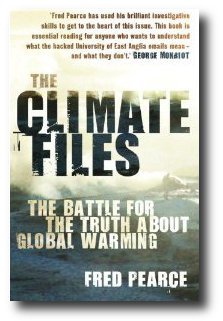Fred Pearce has new book out on Climategate and will be speaking about it at the Royal Institution on Monday. Readers will remember Pearce as the author of a detailed series of postings on the Climategate emails in the Guardian at the start of the year. The book sounds pretty interesting...
To coincide with the launch of his new book, The Climate Files, the veteran environment journalist Fred Pearce discusses how the emails raise deeply disturbing questions about the way climate science is conducted, about researchers' preparedness to block access to climate data and downplay flaws in their research."
Blimey. That will set the cat among the pigeons.
Or will it? Looking at the Guardian's page on the book, it appears that Monbiot likes it..
"Fred Pearce has used his brilliant investigative skills to get to the heart of this issue. This book is essential reading for anyone who wants to understand what the hacked University of East Anglia emails mean - and what they don't" George Monbiot
Mind you, given where Monbiot left off on the story of Climategate, it could be that this is just a reflection of his current understanding of the meaning of the affair - ie that it doesn't disprove AGW but that there are some pretty serious problems with the conduct of individual climatologists.
The other thing to bear in mind is that Pearce's talk may well be set against the background of the Russell panel's findings having just been made public. How is it going to look if there is a whitewash and then Pearce jumps up and says there's a problem?
Exciting times...
(Pearce's book can be pre-ordered at Amazon.co.uk. There doesn't seem to be US availability yet, so American and other non-UK readers who want to get a copy should probably try here. )
 Bishop Hill
Bishop Hill